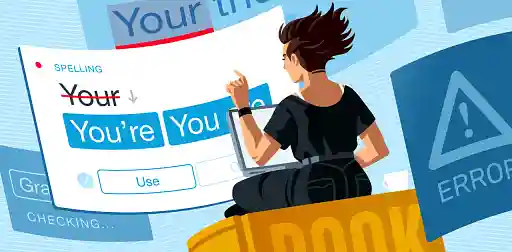Last updated on Oct 14, 2025
Character Questionnaires: 100+ Revealing Character Questions
Martin Cavannagh
Head of Content at Reedsy, Martin has spent over eight years helping writers turn their ambitions into reality. As a voice in the indie publishing space, he has written for a number of outlets and spoken at conferences, including the 2024 Writers Summit at the London Book Fair.
View profile →To help you write nuanced and engaging characters, we’ve created several questionnaires that’ll let you dive into the various aspects of your characters’ personalities.
These questions will guide you to explore your characters' inner worlds, imbuing them with realistic fears, desires, and motivations. In building these psychological profiles, you’ll soon find it easier to make character-driven story decisions (and avoid simply filling your narrative with mindless plot pawns).
For a condensed version of our questionnaire that you can fill out and keep, download our interactive Character Questionnaire PDF:

FREE RESOURCE
Reedsy’s Character Questionnaire
40 questions to help you develop memorable characters.
The Nostalgia Check ⏳
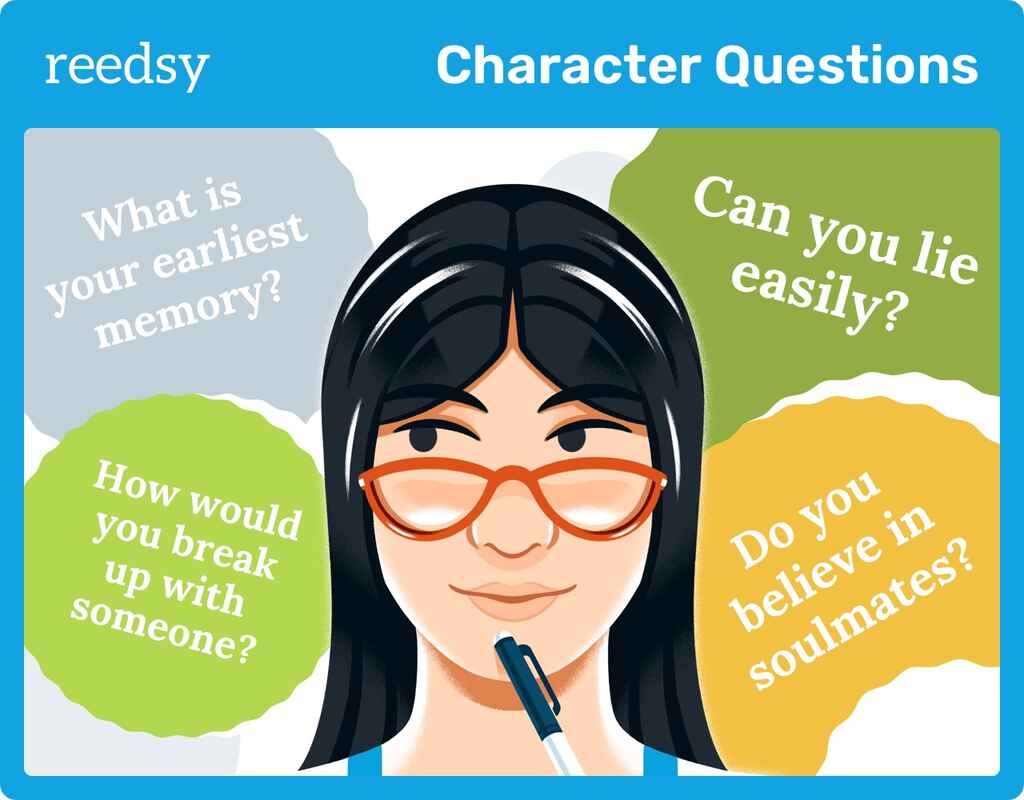 Our actions and decisions are informed by our past experiences. Take a trip down memory lane to explore your character’s backstory in more depth and help you create more believable, relatable characters.
Our actions and decisions are informed by our past experiences. Take a trip down memory lane to explore your character’s backstory in more depth and help you create more believable, relatable characters.
Q: What is the most crucial piece of backstory an author should understand about their protagonist before beginning a novel?
Suggested answer
Whether in the backstory or in the current action of the book, once the reader starts reading, the author should know what their character wants. It can be a long-held desire or something new, based on changed circumstances.
There has to be a motivation and drive in the character. Or if there isn't any, and that is sort of the point of the book, you want to let the reader know why and what in their past has made them the way they are. This sort of "motivation" is a good thing to search for in each character. What has shaped them to do what they do and behave the way they behave in the story? They must stay "in character" throughout the book unless some sort of inner or outer impetus has forced them or inspired them to change their ways.
So this most crucial piece of backstory might be why your protagonist behaves the way they do, what motivates them and why, and what they want.
Melody is available to hire on Reedsy ⏺
- What is your earliest memory?
- What is a memory that makes you swell with pride?
- What is your worst memory?
- Where did you grow up? What was your childhood like there?
- Did you have a childhood nickname?
- What was your relationship with your parents like when you were younger?
- Who were you closest to as a child?
- What did you want to be when you grew up?
- Did you ever get in trouble as a child?
- Who were your childhood best friends?
- Who were your childhood enemies?
- Did you celebrate your birthday throughout your childhood?
- What was your favorite day or holiday when you were a child?
- What was your biggest fear when you were a child?
- What is something you were insecure about when you were a child?
- What is your most embarrassing moment?
- What is something you quit that you now regret giving up on?
- What is something you wish you never learned the truth about?
- If you could relive one day of your life without changing anything that happened, which day would you choose?
- If you could relive one day of your life and change its course of events, which day would you choose?
The “What If” Questionnaire 🤔
 Given our different backgrounds, personalities, and beliefs, we all react in our own way to certain situations. Use the following questionnaire to consider how your character would respond to these hypothetical scenarios.
Given our different backgrounds, personalities, and beliefs, we all react in our own way to certain situations. Use the following questionnaire to consider how your character would respond to these hypothetical scenarios.
Q: What tools or techniques can authors use to develop detailed and effective character profiles?
Suggested answer
Writers can establish good character profiles by examining surface information and interior depth. Beyond physical description, notice personality, values, and contradictions—what the character wants vs. what the character fears. Techniques like freewriting as a character or writing the character's background can elicit subtleties that don't find their way into the main action but still affect behavior. Some authors use Q&A-type questions to explore motivations, habits, and relationships, and other authors create images of the character's past to observe how it affects present decisions. What is most important is consistency: when you know how your character thinks and behaves, their actions make sense, and readers feel that they are interacting with real people and not with plot devices.
John is available to hire on Reedsy ⏺
This is so important because the character will drive your story.. You reader has to be fascinated by your protagonist and be routing for him or her. I always interview my characters in depth. I don't just ask them about the basics of their lives and history. I ask them what they fear most in life, what makes them get up in the morning.
Joie is available to hire on Reedsy ⏺
I provide all my clients with a template that I devised myself for ensuring that every single character in a novel is fully fleshed-out, colourful and contrasting, both within themselves and to other characters.
Vanessa is available to hire on Reedsy ⏺
I've had success doing Enneagram quizzes in each character's persona. Even if you don't believe in personality profiles, it's a good way to check whether a character's goals, motivations, and considerations are consistent. They can reveal gaps where you still have a question to answer about a character's background and, best of all, it reassures you that you're writing characters who contrast with one another, rather than representing different aspects of your temperament as the writer.
Mairi is available to hire on Reedsy ⏺
The most important issue for each character is what they want. Desire and wants fuel the story, especially regarding what the main character wants. When two characters want the same thing, this is when tension can arise organically.
Melody is available to hire on Reedsy ⏺
- If you had a time machine, what would be the first thing you would do with it?
- Your friends are speaking unfairly about a mutual friend. Do you say something or stay silent?
- What would you do if someone brought up your biggest insecurity in front of a crowd of strangers?
- What would you do if you witnessed a victimless crime?
- What would you do if someone tried to threaten you?
- How would you respond to an apology from somebody you still cannot forgive?
- How would you react if someone insulted you to your face?
- How would you react if you saw a friend who owes you money spending frivolously?
- How would you break up with someone?
- If you could have a one-hour conversation with any living person, who would it be?
- If you could change one thing about yourself, what would it be?
- If your house were on fire and you could only save one thing, what would it be?
- If you could only eat one thing for the rest of your life, what would it be?
- If you could only hear one song for the rest of your life, what would it be?
- If you could live anywhere else in the world, where would you go?
- If you could learn the truth behind any mystery or secret, what would it be?
- If you won the lottery, how would it change your life?
- Would you halve your income to be twice as attractive?
- Would you trade ten years of your life to become richer?
- How about to become more attractive?
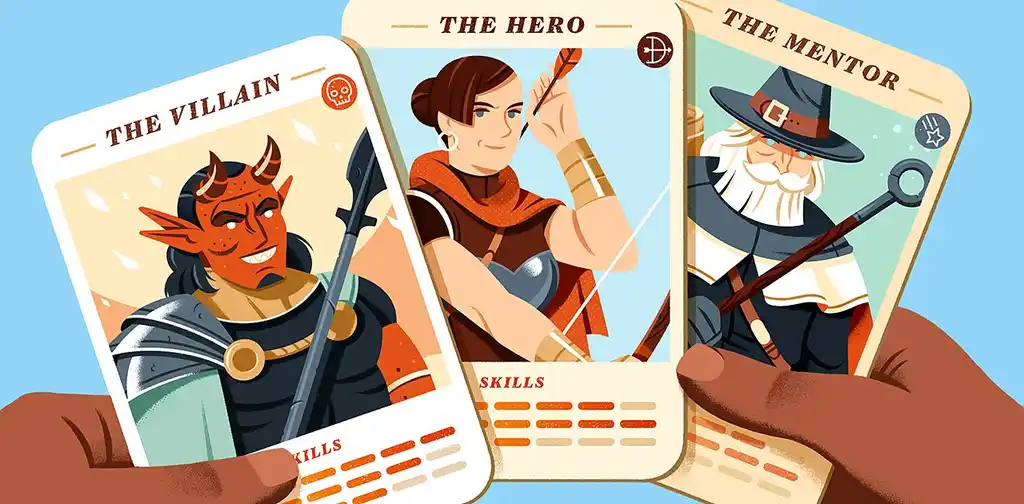
FREE RESOURCE
Reedsy’s Character Profile Template
A story is only as strong as its characters. Fill this out to develop yours.
The Relationships Quiz 💗
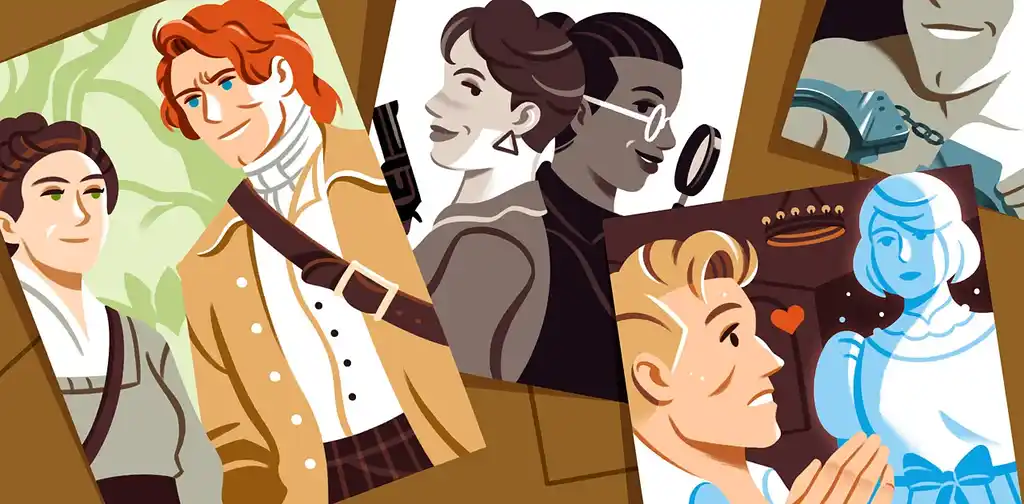
Relationships do more than keep loneliness at bay — they can also spur conflict, encourage growth, and reveal the parts of ourselves that we usually hide from the world. Think about these relationship-related questions to shed light on your character’s views on love, loss, and more.
Q: What drawbacks are there to creating detailed dossiers on characters before the drafting stage?
Suggested answer
Writing is chemistry. It involves experiment and trial, and like every experiment there are occasionally unexpected results. With fiction especially, you may not have a full idea of a character until you begin writing them in different scenarios and relationships -- and I think this is an advantage when you begin your project. Having a fully detailed dossier on a character before you begin can limit your options or contribute to writer's block. After all, characters are not stagnant. They grow and evolve with you as the project forms. You may not realize an aspect of your character until you begin writing and imagining them, or until you have a rough draft. Remember, writing is revision and part of what may need revision are your characters. Having the flexibility to revise may involve leaving part of your characters with only small amounts of scaffolding.
This isn't to suggest you shouldn't have some idea of who your characters are and where they're going. Identifying some core attributes or principles can serve as handy rules for how your characters will act, think, and talk in different scenarios, which can ensure consistency while giving your characters the flexibility to grow into fully fledged personalities. What is their positionality? Their hopes and dreams? Their purpose? What end do you wish them to have? These are open ended questions to ask yourself about your characters that don't commit them to a full dossier.
Mitchell is available to hire on Reedsy ⏺
Absolutely! The main drawback is that creating dossiers can get in the way of writing the book. It's easy to get lost in the fun of research and imagining backstories and details (which may or may not matter). And it's even easier to feel like we're being productive while crafting character sketches or other support documents, when in fact, we're really procrastinating! I find it more helpful to jot down quick notes about the character as I'm writing. This helps me keep things straight while also forcing me to write the story not the sketch.
Caryn is available to hire on Reedsy ⏺
I find it helpful to have at least the basic character arc for the main character. I can also provide my clients with a multi-page character development Q & A, which writers may find a useful tool for later characterisation, even if not all the details end up on the page.
Eva maria is available to hire on Reedsy ⏺
Like world building in any novel, creating detailed character profiles can be beneficial to some authors. They're a way to 'get a feel' for you characters before diving into the story. But going too detailed can lead to a few drawbacks:
- If you have too much on your character, when you actually start writing it might not feel as organic to explore who these characters are, since much of them has already been mapped out
- Sometimes you won't know everything there is to know about a character, and spending too much time pre-writing trying to figure it out keeps you from actually writing it
- Similarly, with any kind of plotting, worldbuilding, character building, and more, I sometimes see authors get so caught up in planning for the book they're going to write that they don't, you know, write the book.
Writing a book is a daunting task, so it's understandable that you want to have as much planned out as possible. But what I always recommend to authors I work with, and especially authors who are stuck on where to go next with their book or how to start, is to get just enough down to where they feel like they have a rough idea of where the book's going, and then to simply start writing. You might have a few hiccups, you will very likely have to edit some things or pause to redraft parts of your outline (if you use one), but once you start writing typically ideas start to flow and you're able to fill in more of the gaps that were empty before.
Sean is available to hire on Reedsy ⏺
One of the main drawbacks to detailing too much of your characters at the outset is that you'll feel like there's less room for them to act spontaneously when various situations (that you don't yet know about!) come up in the story. I'd generally recommend taking a more broad strokes approach to character detailing so that you've got more wiggle room, and don't feel so hemmed in by your original conception of who your characters are. Let them breathe. Let them react more in the moment as you write.
Brett is available to hire on Reedsy ⏺
- Do you believe in love at first sight?
- Do you believe in marriage?
- Do you believe in soulmates?
- How many romantic relationships have you had?
- Why did your last relationship end?
- How short was your shortest romantic relationship? How did it start and end?
- How long was your longest romantic relationship? How did it start and end?
- What was your first kiss like?
- What was the best date you have ever been on?
- What was the worst date you have ever been on?
- How well would you handle a long-distance relationship?
- What lessons have you learned from your past relationships?
- Would you rather approach a person of interest or wait for them to approach you first?
- How would you feel after a one-night stand?
- Have you ever kept someone in your life who you did not get along with (for example, a friend you disliked or argued with often)? Why did you avoid saying goodbye?
- How would your best friend describe you?
- How would your ex describe you?
- How would your worst enemy describe you?
- Who is someone you wish you never met?
- Is there a “one that got away” in your life?
- Who is the most important person in your life?
The “How Bad Are You” Test 💀
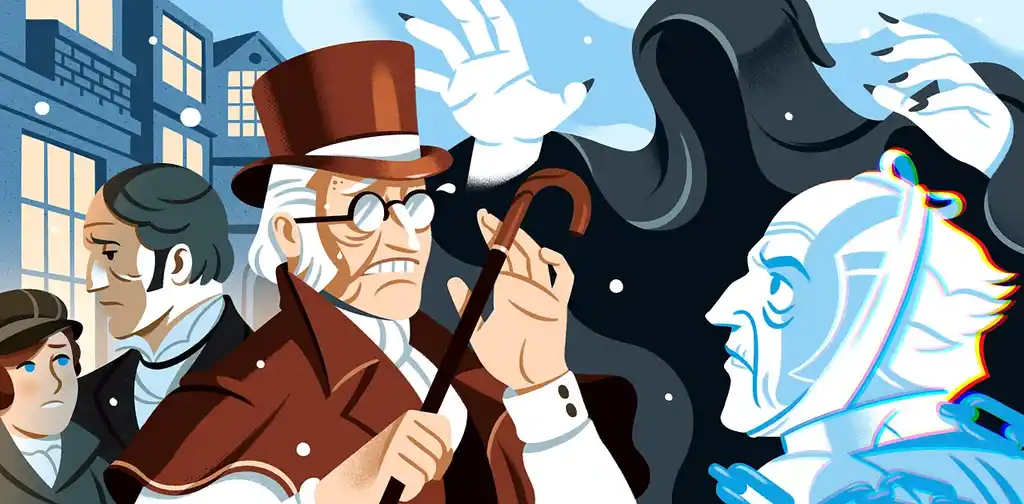 Time to get critical. Use the following questions to explore the less-than-lovely aspects of your character. Even the most heroic of protagonists have a couple of skeletons in their closet.
Time to get critical. Use the following questions to explore the less-than-lovely aspects of your character. Even the most heroic of protagonists have a couple of skeletons in their closet.
Q: What's the best piece of writing advice for an author who wants to improve their craft?
Suggested answer
Join critique groups! These were invaluable to me when it I started writing and even taught me how to edit! Reading books will become dated with old advice, so stay up to date with blogs, trends, audiences, and read, read, read!
Stephanie is available to hire on Reedsy ⏺
Practice and read!
In the same way that you need to practice a musical instrument to get better, you need to do the same with writing too. Very few writers will publish the first book they ever write!
The other thing that will help you to improve your writing craft is reading. Read the books that are selling well in your genre right now, not just the bestsellers from a decade ago. Study them. Look at the reviews for these books and listen to what readers are saying.
There are loads of brilliant books that will help you to write an effective novel as well (Into the Woods by John Yorke, The Science of Storytelling by Will Storr, Story Genius by Lisa Cron and Save the Cat Writes a Novel by Jessica Brody are a few of my favourites). Even if you don't agree with everything they say (I don't necessarily agree with every piece of advice in the above!) it's so helpful to see a range of different perspectives. You'll also quickly be able to see the patterns and advice from these books in the bestsellers you read. There are also loads of podcasts, blog posts, YouTube videos and audiobooks out there too, as well as Reedsy's own masterclasses!
Siân is available to hire on Reedsy ⏺
- What is the worst thing you have ever wished on somebody? Who was this person?
- Is there somebody you have not been able to forgive? What did they do? And do you want to forgive them?
- Can you lie easily?
- When was the last time you lied? What made you do it?
- Do you handle rejection well?
- How do you react when you receive bad news?
- Have you ever done something illegal?
- Are you more likely to ask for permission or forgiveness?
- What terrible thing have you done that you never thought you would do?
- What criticism would your worst enemy make of you that you would secretly agree with?
- What is your biggest pet peeve?
- What is the cruelest thing you have ever said to anyone?
- When was the last time you got extremely angry? What angered you?
- When was the last time you cried? Why did you cry?
- Have you ever made someone else cry with your actions or words?
- What never fails to upset you every time you hear about or see it?
- If you could erase one thing from existence, what would it be?
- What is your most controversial opinion?
- What is something about you that you would never want anyone else to know?
The Potluck Round ✨
 You won’t find any basic questions about favorite colors and animals here. This questionnaire has some real thinkers to help you discover quirks about your character that you might have missed otherwise.
You won’t find any basic questions about favorite colors and animals here. This questionnaire has some real thinkers to help you discover quirks about your character that you might have missed otherwise.
Q: What lessons can first-time authors gain from analyzing popular books in their chosen genre?
Suggested answer
Analysing popular books in your chosen genre will help you in two ways. Firstly, you can learn from the choices and tactics used by those authors. Secondly, you can see how your proposed book fits into the market.
Susanna is available to hire on Reedsy ⏺
Look for the balance between narration and dialogue. Watch how and when authors introduce new characters. Look for how visual and sensory details are woven into the story as it goes along, and how the author doesn't stop for long to weave in these details.
Look for the initial inciting incident and pay attention to where it falls in the book. Watch for how much happens in the first 50 pages, and see if the plotting of your own book moves along at a similar pace.
Look at those all-important first lines and first chapters of a book and see if you can glean knowledge as to why the author chose to open with that sentence or paragraph.
Melody is available to hire on Reedsy ⏺
- What would your perfect day look like?
- What is your favorite mantra or quote?
- What is the strangest job you would be willing to do?
- What is a job you would never consider, no matter how good the pay?
- What was the last book you read? Did you like it? Why or why not?
- How do you feel in large groups versus small ones?
- Would you rather surprise someone or be surprised?
- What is the most memorable compliment you have ever received?
- What is something you have always wanted to learn or master?
- What is one memory you never want to forget?
- When did you feel most alone?
- What is a question you have always wanted to ask but cannot bring yourself to?
- What does success look like to you?
- Do you think it is ever okay to lie?
- What are you afraid of the most?
- If you could change your name, would you? Why or why not?
- What is something most people do not know about you?
- What do you think is the biggest misconception other people have about you?
- What is something about yourself that you would never change?
- What do you think happens after death?
- What is something you want to be remembered for?
For more tips on how to write unforgettable characters, check out our free course on developing characters readers will love, or our guide to coming up with interesting character quirks.




